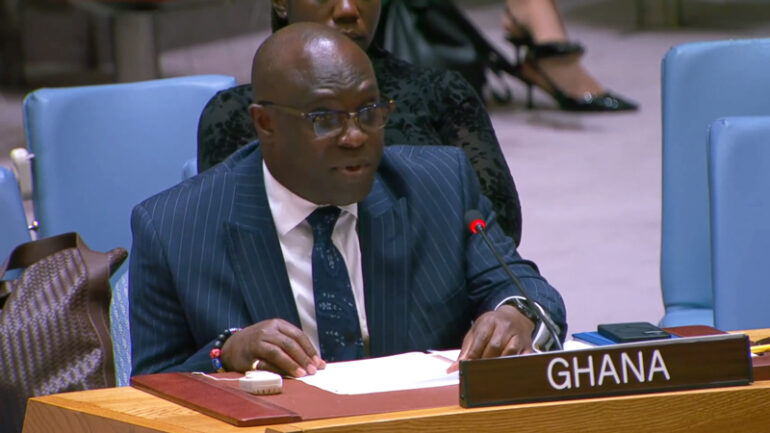UNSC Maintenance of international peace and security – The future of Peace Operations

Ambassador Harold Agyeman
Ghana’s Representative to the United Nations
United Nations HQ
New York, September 11th 2025
OPEN DEBATE ON THE FUTURE OF PEACE OPERATIONS: KEY ISSUES, OPPORTUNITIES AND CHALLENGES IN THE CONTEXT OF THE REVIEW OF THE FUTURE OF ALL FORMS OF PEACE OPERATIONS
Mr. President,
Let me thank your delegation, the Republic of Korea, as well as those of Denmark and Pakistan, for this important meeting on peace operations.
Ghana salutes the contribution of peacekeepers and pays tribute to all the gallant personnel who have made the ultimate sacrifice for the cause of peace.
I recall that two years ago, almost to the day, I gave a briefing in this Council on peacekeeping, in my capacity then as the Chair of the Working Group on peacekeeping. The concerns around peace operations that existed two years ago have not changed – if anything at all there is a renewed urgency required to address them.
Today’s conflict environments are often cast in the shadows of rising geopolitical tensions; rooted in the proliferation of armed groups, exclusion, inequalities, social and political marginalization; exacerbated by climate insecurity, food insecurity, violent extremism, worsening terrorism; and spread by the flames of misinformation and disinformation.
These circumstances require us to pivot and follow a new path. The direction identified by the Pact of the Future for a review of peace operations provides us a way to effectively consider the gamut of options available to adapt peacekeeping and make it more impactful for the populations caught in the throes of instability.
As we look forward to the future of peace operations, we must necessarily be reminded of the challenging circumstances within which mandates are crafted and supported, the dangerous environments they operate in, and the diminishing impact of operations in host States. But also, in the face of such a reality we must muster the courage to be bold and deliberately unconventional with how we imagine, tailor and operationalize peace operations.
For today’s open debate, Ghana would like to highlight a few points in support of the call for reflection and hopefully as a contribution towards the prospect of a better future of how the Organisation responds to the prevailing peace crises.
Mr. President,
Peace operations must have a clarity of their strategic objectives and be focused on realistic operational goals. They must, through special political missions, aim at preventing conflicts, enabled by a reinvigorated preventive diplomacy agenda, and where conflicts occur, responded with resoluteness to help conflicting parties abate the bleeding, clean their wounds, and set their societies off to self-recovery and sustained peace. That enterprise by the United Nations cannot however be made to replace the role of host States. It must yield to national demands and the necessity for a tailored approach that closes identified gaps, trims the scope of operations to afford agility, and adopts a modular approach to enhance flexibility of methods and effectiveness of impact.
Peacekeeping must not be allowed to grow antlers beyond what is necessary for its envisaged key roles. With 80 years of history and many lessons to guide us, our goal should acknowledge the interconnectedness of the peace continuum without necessarily creating a single backbone for response within the continuum – which includes conflict resolution, conflict prevention, peacekeeping, peacebuilding and sustaining peace. From prevention of conflicts to sustaining peace, the transformative impact of the United Nations’ peace architecture must be leveraged for full advantage to foster an environment conducive to lasting peace and stability.
This would require an enhanced level of coordination between mandates adopted by this Council and the work of other bodies such as the Peacebuilding Commission as well as those within the development space. It would also require that we mobilise the political will to narrow the gap in the resources put at the disposal of peacekeeping missions and those we are prepared to give UN Country teams to support broad peace efforts.
Mr. President,
Many have spoken about the need for primacy of politics in mandates for peacekeeping missions and Ghana agrees with them. Ghana supports the delivery of coherent and unified political strategies for resolving conflicts and, within the regional context of Africa, calls for the deepening of the peace engagement between the United Nations and the African Union to Silence the Guns on the continent of Africa.
In this context, also, Ghana urges the faithful implementation of resolution 2719 as a necessary and effective option for resolving the limitations of United Nations peace operations on the African continent. The challenges that this Council have encountered in the application of 2719 does not define what the framework resolution stands for nor should those challenges diminish the potential of this well-thought through partnership framework and its envisaged impact for the resolution of the contradictions to peace on the African continent.
Mr. President,
In closing, Ghana remains committed to advancing the effectiveness of United Nations peace operations. Next month, from 14 – 16 October, in the city of Accra, Ghana and Sweden would be redeeming the pledge to host the Challenges Annual Forum 2025, in support of the Secretary-General’s ongoing review of all forms of peace operations.
We are optimistic that, underpinned by a strong assessment of the existing challenges and the available opportunities, including regional collaboration, peace operations can be brought back towards the path of reliability and provide assurance for populations in conflict situations that this important instrument of the United Nations can still be a source of hope.
I thank you.
